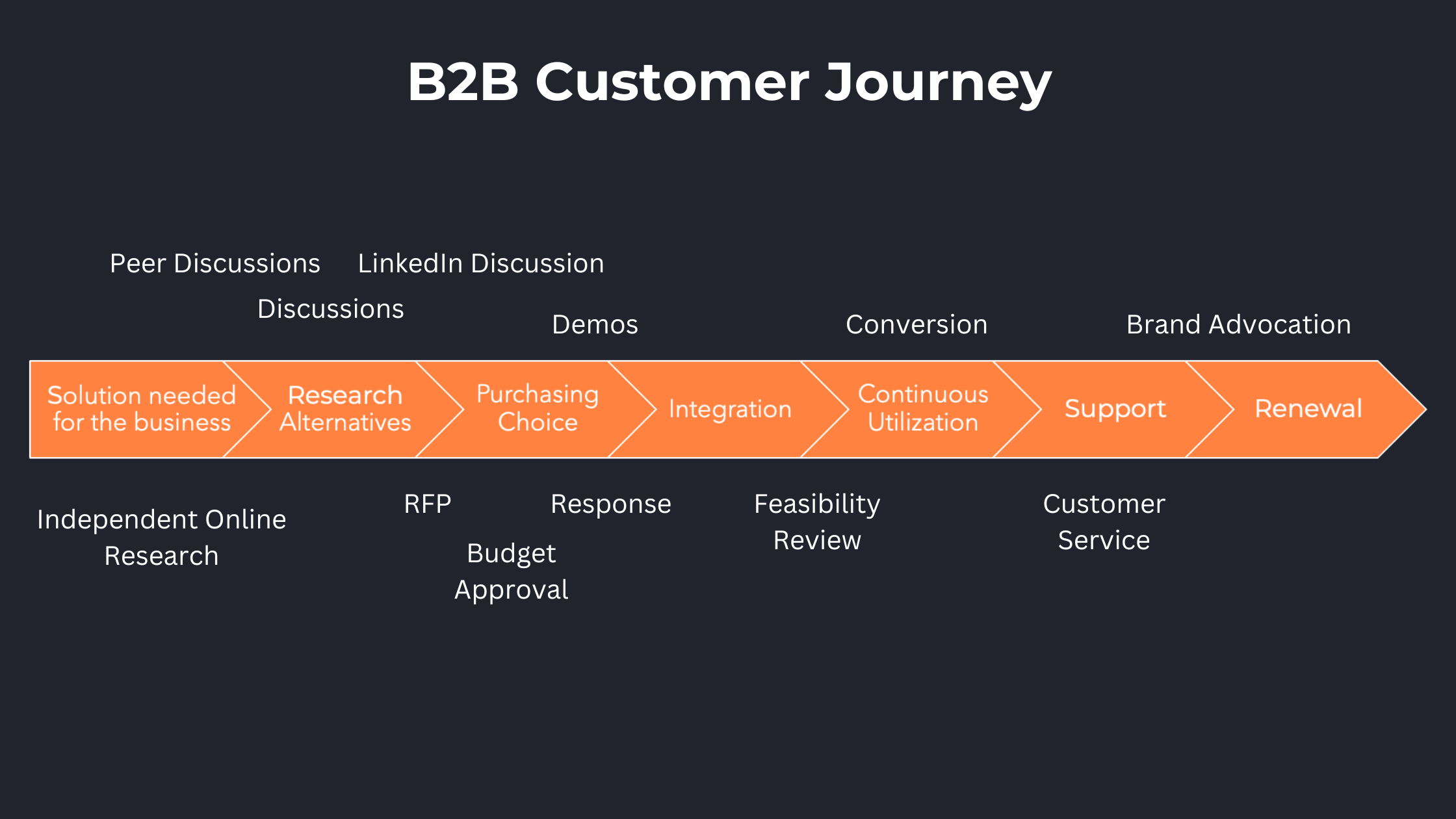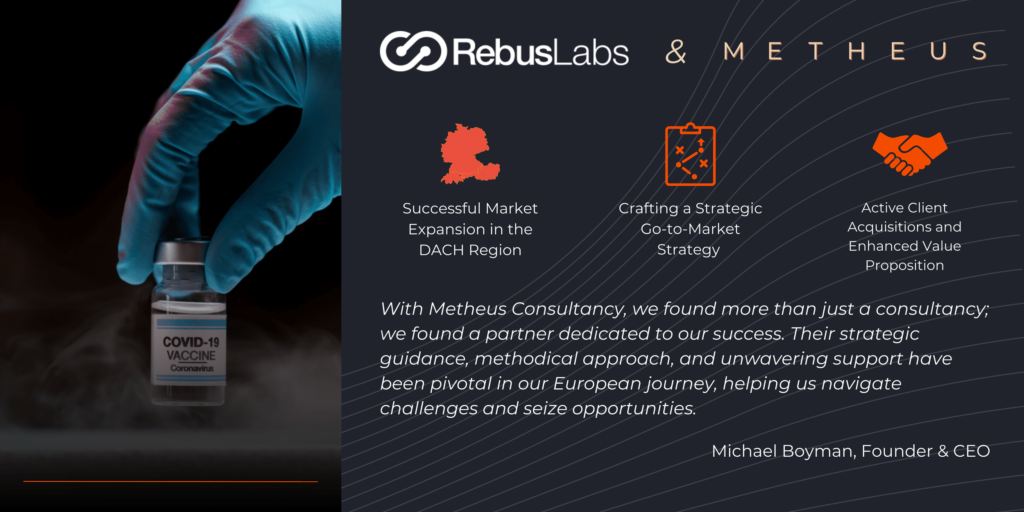B2B (Business to Business) Customer Journeys represent the pathway businesses follow when making purchasing decisions or interacting with other businesses. These journeys typically last longer and require the involvement of multiple decision-makers. The process may vary depending on the industry, the product or service sought, and the specific needs of the business.
-
Identifying the Need: It starts with a business recognizing a need or problem within its operations. This need could be anything from new equipment, software, services, or raw materials.
-
Research and Information Gathering: The business begins researching different options to address its need or solve its problem. At this stage, they collect information from various sources to compare potential suppliers, products, or services.
-
Decision Making: The business decides on which supplier or solution to choose, based on factors like pricing, quality, delivery times, among others.
-
Purchase Process: Negotiations are made and orders are placed with the selected supplier for the products or services.
-
Usage and Evaluation: The purchased products or services are put to use within the business, and their performance is evaluated.
-
Customer Service and Support: The business contacts the supplier if any issues arise with the purchased products or services, or if additional support is needed.
-
Loyalty and Repurchase: If the business has a satisfactory experience and its needs are met, it may tend to repurchase from the same supplier or solution, establishing a long-term relationship.
Every B2B customer journey will differ and will change depending on the specific needs of the business and the industry. Hence, it’s imperative for suppliers and businesses to understand these journeys and provide services appropriately. A global B2B Pulse survey covering over 3,800 individuals across 13 countries this year finds that companies offering the best multi-channel experiences are increasing their market shares by at least 10% annually.
Differences Between B2B and B2C Journeys
B2B customer journeys involve interactions between businesses. The target audience generally comprises professional buyers, decision-makers, and experts, making it more tailored. On the other hand, B2C (Business to Customer) customer journeys cover the purchasing processes of individuals or consumers. B2C tends to be mass-oriented as its target audience is usually a broad and diverse consumer base.
In the business to business model, customer journeys entail more complex and prolonged processes. Decision-making involves extensive research, meetings, and needs analysis. B2B customers make purchases for business-centric reasons such as improving operations, boosting operational efficiency, or reducing costs. Conversely, B2C customer journeys, driven by more personal reasons like personal usage, satisfaction, or entertainment, entail faster and simpler purchasing processes. Consumers generally act as single decision-makers.
Furthermore, B2B encompasses more formal and business-focused communication channels and deals with complex and customized products or services. Channels such as meetings, emails, business communities, and trade shows are frequently used. B2C usually encompasses a broader range of consumer-friendly channels like websites, social media, advertisements, and retail stores, dealing with more standard and mass-produced products or services.
These differences make B2B and B2C customer journeys unique. Businesses should address these distinctions, considering their target audiences and business needs, and develop appropriate strategies accordingly.
Evolution of B2B Customer Journeys
B2B sales processes are evolving. Following three years of significant changes, including a rapid transition to digital channels triggered by the pandemic, decision-makers now prefer companies that offer an excellent multi-channel experience supported by personalized marketing. Companies failing to do so are losing market share.
This evolution began years before the pandemic-triggered rush to digital channels: customers have long wanted the ability to purchase anywhere, anytime, and on any device, much like in B2C processes. This year’s global B2B Pulse survey covering over 3,800 decision-makers across 13 countries reveals that companies offering the best multi-channel experiences are increasing their market shares by at least 10% annually.
The B2B companies gaining the most market share are simultaneously employing five major modern sales and marketing tactics: leveraging advanced sales technologies, enhancing hybrid sales teams and capabilities, offering personalization, applying strategies specific to third-party marketplaces, and achieving e-commerce excellence within the marketing and sales funnel. Especially in the early stages of the purchasing process, these companies are developing a sophisticated digital customer experience using tools like social media, mobile devices, and text messaging.
They are facilitating a larger share of their sales efforts through third-party and owned marketplaces increasingly. Companies continuing to use these tactics have twice the chance to see more than a 10% market share growth compared to companies focusing on just one.
What Makes Brands Successful in B2B Processes?
Sales Teams and Personalized Marketing:
Successful B2B businesses effectively utilize both internal and external sales teams. This enables better service to customers and reaching out to customers through different sales channels. Instead of focusing solely on specific accounts, they embrace hyper-personalization strategies. They use data analytics and segmentation to understand customers’ unique needs and preferences. A Gartner study revealed that suppliers providing personalized customer experience witnessed an 18% improvement in revenue.
E-Commerce:
Companies successfully embracing e-commerce are seeing tremendous growth. E-commerce platforms offer B2B companies an opportunity to serve their customers better by making the purchasing process easier and more efficient. The adoption of e-commerce is no longer optional, but a necessity in the B2B sector.
Customer Service:
Providing outstanding customer service before, during, and after the sales process is crucial for retaining customers and growing the business. It also helps in building trust, which is a significant factor in B2B relationships.
Technological Advancements:
Leveraging the latest technologies like Artificial Intelligence (AI), Machine Learning (ML), and the Internet of Things (IoT) can significantly improve the customer journey in B2B settings. These technologies provide the ability to collect and analyze data to better understand customer behavior and preferences.
In conclusion, understanding and adapting to the evolving B2B customer journey is crucial for businesses looking to grow and remain competitive in this domain. The transition to digital channels, combined with personalized marketing and excellent customer service, is now more important than ever. Businesses should also consider investing in the latest technological advancements to better serve their customers and improve their overall customer experience.
The Importance of Customer Experience on Your B2B Journey
Businesses can gain a competitive edge by providing as good a customer experience as possible to stand out and excel among competitors. The B2B audience tends to stay loyal and is more inclined to repurchase from businesses that ease their operations and add value to them. Additionally, long-term business relationships enhance profitability for companies.
A successful purchasing experience positively affects your business’s reputation. A good reputation eases the attraction of new customers and the retention of your existing audience. Satisfied users might recommend your business to others, which is a distinct and effective way to broaden your target audience.
Customer experience data assists businesses in continuously improving their processes and strategies. Customer feedback and analytical data can be used to identify weaknesses and opportunities.
Consequently, customer experience is a critical factor for the success and sustainability of your business on the B2B journey. Offering as pleasant an experience as possible throughout the sales process is crucial for long-term success and can aid businesses in gaining a competitive advantage.
Challenges of the B2B Customer Journey
B2B transactions are more complex compared to B2C (business-to-consumer) transactions. According to a survey by Gartner, 75% of the respondents described this process as quite “difficult and complex.” It can involve multiple decision-makers, long sales cycles, and large budgets. This complexity necessitates a more detailed analysis at every stage of the journey. It’s crucial to develop a detailed understanding of the needs, motivations, and impact of each decision-maker.
Having sufficient data and access to analytical tools is essential when mapping out the B2B customer journey. It may be challenging to effectively analyze customer data to make informed decisions. B2B customer journey requires collaboration across different departments. Ensuring communication and coordination between different sections of the business (sales, marketing, customer service, etc.) is crucial.
Market dynamics are continuously variable. Factors like new competitors, technological advancements, or economic changes can affect the customer journey, necessitating continuous updates.
B2B customer journeys may require differentiated approaches for different customer segments and industries. This can make it more challenging to conduct further customization and segmentation work.
Despite these challenges, creating a B2B customer journey map helps the business develop a deeper understanding of its customers and provide better service.
In conclusion, mastering the B2B customer journey is pivotal for business growth and competitiveness, especially in the digital era. These journeys, enriched by personalized marketing and excellent customer service, are integral to fostering long-term relationships and achieving market prominence. In order to elevate your B2B customer journey with Metheus Consultancy, our adept consultants are ready to tailor solutions to meet your business needs. Contact us today to propel your business towards substantial success!





